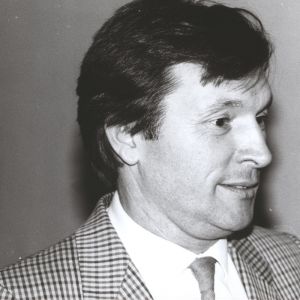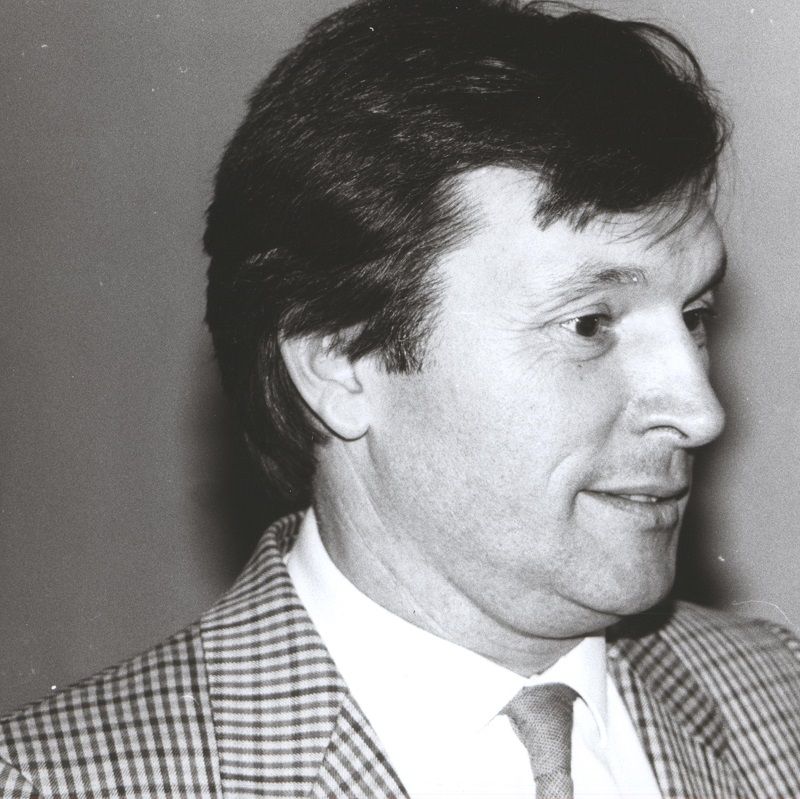Krauze Zygmunt
-
composer, performer
composer and pianist, b. 19 September 1938 in Warsaw. He studied piano with Maria Wiłkomirska (graduated in 1962) and composition with Kazimierz Sikorski (degree in 1964) at the State Higher School of Music in Warsaw. The French government granted him a scholarship for composition studies with Nadia Boulanger in Paris (1966-67).
Since 1963 he has given many concerts in Europe and the United States as a pianist performing primarily contemporary works. He has been working with such conductors as Gary Bertini, Jan Krenz, Leif Segerstam, Kazimierz Kord, Kazuyoshi Akiyama, Ernest Bour, Hans Zender, Peter Eötvös, Antoni Wit and Luca Pfaff. In 1967 in Warsaw he founded the "Music Workshop", an ensemble which specialized in the performance of most recent music. It consisted of four instrumentalists: the clarinettist Czesław Pałkowski, the trombonist Edward Borowiak, the cellist Witold Gałązka, and the pianist Zygmunt Krauze. The ensemble commissioned over 100 compositions that were created by renowned composers from around the world, including: Louis Andriessen, Morton Feldman, Michael Nyman, Per Nørgård, Mauricio Kagel, Henryk Górecki, Wojciech Kilar, Kazimierz Serocki and Witold Szalonek.
Krauze was one of the first composers in Poland to employ new performance forms, for example, musical space compositions (installations). He collaborated with architects: Teresa Kelm in the Contemporary Gallery in Warsaw (1968, 1970), with Wiesław Nowak and Jan Muniak in Metz (1987) and in the Museum of Contemporary Art in Łódź, as well as in the natural setting of the Eggenberg Castle in Graz (1974) and the Rohan Palace in Strasburg.
As well as giving concerts, Krauze has also been an active teacher, lecturing on composition and piano playing in many of the world's academic centers. Since 1965 he has been conducting seminars and composition courses in Darmstadt, Basel, Paris, Tokyo, Stockholm, Jerusalem, Beijing, Hong Kong and at universities in the USA: Indiana University at Bloomington and the University of California in Santa Barbara. During 1973-1974 he worked in Berlin as an artist-in-residence invited by the Deutcher Akademischer Austauschdienst. In 1981, he was a Visiting Professor at Yale University in New Haven and in 1996 he received the title of Eminent Corresponding Professor in Keimyung University in Daegu, South Korea. In 2002, he was appointed as a Professor of Composition at the Academy of Music in Łódź and from 2006 he has been lecturing at the Fryderyk Chopin University of Music in Warsaw. In May 2013 Krauze was awarded the degree of Doctor honoris causa of National Music University in Bucarest.
Krauze's activity as an organiser of musical events began in 1970 when he became a member of the Repertoire Committee of the Warsaw Autumn Festival. He held this position for 11 years. At the invitation of Pierre Boulez in 1982, he became an artistic advisor at the Institut de Recherche de Coordination Acoustique/Musique (IRCAM). In 1983-84 he hosted weekly music programs at Radio France Musique.
Krauze has held many public functions in cultural institutions in Poland and abroad: in 1987-90 he was President of the International Society for Contemporary Music (ISCM/SIMC), and since 1989 - President of the Polish Section of this society. In 1992 he organized the World Music Days in Warsaw. In 1987 he was appointed President of the International Society for Contemporary Music and has been an honorary member of the organization since 1999. In 2011, Krauze became an honorary member of the Polish Composers' Union and a year later he was awarded the title of Coryphaeus of Polish Music in the category of Personality of the Year. He was one of the founding members of the Witold Lutosławski Society and for one term held the position of its president.
For his artistic activity he has received many honours, including 1st prize at the National Competition for Performers of Contemporary Piano Music in 1957; 2nd prize in the Young Composers' Competition of the Polish Composers' Union in 1965 (for String Quartet no. 1 - 1965); in 1966 – 1st prize in the International Gaudeamus Competition for Interpreters of Contemporary Music in Utrecht; in 1975 - the Silver Cross of Merit (a Polish state distinction); in 1984 - the title of Chevalier dans l’Ordre des Arts et des Lettres, granted by the French government; in 1988 - the award of the Polish Composers' Union; in 1989 and 2005 - the Minister of Culture and Arts Award, in 1994 - the Gold Chopin Medal, awarded by the Frédéric Chopin Society in Warsaw, in 2007 - the French National Order of the Legion of Honour.
Since 2001 he has been the artistic director of the Music Gardens Foundation, which every year organises a month long Music Gardens Summer Festival at the Royal Castle in Warsaw and International Summer Course for Composers SYNTHETIS in Radziejowice. He is regularly invited to be a judge in international composition competitions throughout the world.
updated: 2016 (Aleksandra Braumańska)
Composer's official website: https://zygmuntkrauze.com/
Creation
Zygmunt Krauze is an important artist of his generation: a respected composer, valued pianist, educator, organiser of musical events and a judge in many international competitions. His artistic achievements and efforts in the promotion of music have been recognised with many awards and distinctions, including the French National Order of the Legion of Honour (2007) and the Chevalier dans l’Ordre des Arts et des Lettres (1984). In 1987 he was appointed President of the International Society for Contemporary Music and has been an honorary member of the organization since 1999. In 2011, Krauze became an honorary member of the Polish Composers' Union and a year later he was awarded the title of Coryphaeus of Polish Music in the category of Personality of the Year.
Krauze’s compositions include five operas: The Star (1981), Balthazar (2001), Yvonne, Princess of Burgundy (2004), Polyeucte (2010) and The Trap (2011). They were staged in such theatres as the National Theater in Mannheim, Theatre National de la Colline in Paris, Staatsoper Theater in Hamburg, Teatr Wielki in Warsaw, Opera Wrocławska, Warszawska Opera Kameralna and Théâtre du Capitole in Toulouse. In 2012 a staging of the opera Polyeucte received the award of the French Syndicat de la critique Théâtre, Musique et Danse as the best musical creation of the year.
The instrumental forms employed by Krauze vary from miniatures to symphonic works engaging hundreds of musicians. In his compositions, piano is the instrument given the highest priority. As an actively performing pianist, Krauze not only composes for this instrument, but also performs his own compositions. This applies both to his early work, such as Six Folk Melodies (1958), through compositions resulting from experimentation with musical notation (Five Unitary Piano Pieces 1963, Triptych 1964), later experiments with the sound of the piano (Stone Music 1972, Arabesque 1983, Adieu 2001), theatrical games (Gloves Music 1972, One Piano Eight Hands 1973) and piano concertos (1976, 1996) where virtuosity is combined with a strong emotional charge. Other important instrumental works include: Tableau Vivant (1982) for chamber orchestra, Blanc-rouge / Paysage d'un Pays (1985) for a wind orchestra, a mandolin orchestra, an accordion orchestra and 6 percussions, Quatuor Pour La Naissance (1985), Piano Quintet (1993), Canzona for a chamber orchestra (2011) and Memories of the East (2012) for 85 Chinese instruments.
Unitary music is exceptionally important in the list of Krauze’s work. As he says: The sound is individual enough to make it possible to distinguish it from the chaos of other music and other sounds. The performed composition has the ability to put time in order. (...) The beginning of each composition immediately exposes the entire range of sounds and during the piece nothing new is introduced. There will be no surprises. (...) This music creates the space for a different way of being perceived. A perfect situation would occur if the music were continually present, the listener came at the time that he or she felt convenient and left when the right moment right to do so was found. The theoretical base of unitary art comes from the paintings of Władysław Strzemiński. Examples of Krauze’s unitary music are Polychromy (1968), Pieces for Orchestra No. 1 (1969), String Quartet No. 2 (1970) and String Quartet No. 3 (1982).
Music for theatre is also present among Krauze’s compositions. He has been collaborating with Jorge Lavelli, an Argentinian director living in France, for over three decades. From this collaboration grew musical illustrations to plays staged in the Comédie-Française and in the Theatre National de la Colline in Paris, including Polyeucte by Pierre Corneille (1987), Opérette by Witold Gombrowicz (1988), Macbeth by Eugene Ionesco (1992), Merlin by Tankred Dorst (2005), Oedipus Rex by Sophocles (2008) and El Avaro by Moliere.
The last, however, not least important, group of works are choral pieces and songs. The most notable among them are compositions from recent years: Ball In The Opera (2006) for chamber choir and 12 instruments based on Julian Tuwim's text, and Voyage de Chopin (2010) for a chamber choir a capella, or with an ensemble of folk instruments, based on Chopin's letters. Five Songs for Baritone and Piano (2010) is influenced by the poetry of Tadeusz Różewicz (2010) and La Terre (1995) for soprano, piano and orchestra, illustrates Yves Bonnefoy’s poems.
Krauze is often invited to cooperate with foreign cultural institutions. Nearly all of his compositions are commissioned. His most important partners are: the Ministries of Culture of Poland and France, Austrian Radio, Westdeutscher Rundfunk in Cologne, Südwestrundfunk Radio in Baden-Baden, the Gulbenkian Foundation in Lisbon, Suntory Limited in Tokyo, the National Theater in Mannheim, Radio France and Polskie Radio. Zygmunt Krauze's compositions have been performed at numerous music festivals both in Poland and abroad, as well as in renowned concert halls, such as Wiener Konzerthaus, Concertgebouw in Amsterdam, Bellas Artes in Mexico City, Palais de Festival in Cannes and Beethovenshalle in Bonn. Many of his compositions have been recorded and released on records of Polskie Nagrania, DUX, ORF, Nonesuch, Thesis, Musical Observations (CP2), Collins Classics, Warner Classics, Recommended Records and EMI.
Compositions
- Three Preludes for piano (1956)
- Five Pieces for piano (1958)
- Prelude, Intermezzo, Postlude for piano (1958)
- Two Inventions for piano (1958)
- Six Folk Melodies for piano (1958)
- Seven Interludes for piano (1958)
- Sonatina for piano (1958)
- Reed Trio for oboe, clarinet and bassoon (1958)
- Three Studies for piano (1958)
- Theme with Variations for piano (1958)
- Monody and Fugue for piano (1959)
- Four Dances for piano (1959)
- Ohne Kontraste für Klavier (1960)
- Prime Numbers for two violins (1961)
- Malay Pantoons for 3 flutes and alto (mezzo-soprano) (1961)
- Five Unistic Pieces for piano (1963)
- Triptych for piano (1964)
- String Quartet No. 1 (1965)
- Esquisse for piano (1966-67)
- Entrée for clarinet, trombone, cello and piano (1968)
- Polichromy for clarinet, trombone, cello and piano (1968)
- Spatial-Musical Composition No. 1 for 6 tapes (1968)
- Piece for Orchestra No. 1 (1969)
- String Quartet No. 2 (1970)
- Spatial-Musical Composition No. 2 for 2 tapes (1970)
- Piece for Orchestra No. 2 (1970)
- Fallingwater for piano (1971)
- Voices for any 15 instruments (1972)
- Folk Music for orchestra (1972)
- Stone Music for piano (1972)
- Gloves Music for piano (1972)
- Aus aller Welt stammende for 5 violins, 3 violas and 2 cellos (1973)
- One Piano Eight Hands for 4 musicians playing one upright piano out of tune (1973)
- Song for 4-6 optional melodic instruments (1974)
- Idyll for tape and 4 soloists playing folk instruments (1974)
- Automatophone [1st version] for 15 playing mechanisms and 15 plucked string instruments (1974)
- Fête galante et pastorale [1st version] for 6 instrumental groups and 13 tapes (1974)
- Soundscape for tape and 4 soloists playing 4 cithers, 4 melodicas, 8 recorders, 8 sheep’s bells, 8 wine glasses and 4 harmonicas (1975)
- Fête galante et pastorale [2nd version] for orchestra and 4 soloists playing folk instruments (1975)
- Automatophone [2nd version] for 3 or more mandolins, 3 or more guitars, 3 or more playing mechanisms (1976)
- Piano Concerto No. 1 (1976)
- Suite de dances et de chansons for harpsichord and orchestra (1977)
- Music Box Waltz for piano (1978)
- Ballad for piano (1978)
- Violin Concerto (1980)
- Star [1st version], chamber opera for 2 sopranos, 2 mezzo-sopranos, alto, tenor saxophone, trumpet, percussion, accordion, electric guitar, violin and double-bass (1981)
- Diptychos for organ (1981)
- Tableau vivant for chamber orchestra (1982)
- Commencement pour clavecin solo (1982)
- Piece for Orchestra No. 3 (1982)
- String Quartet No. 3 (1982)
- Arabesque for piano and chamber orchestra (1983)
- Quatuor pour la naissance pour clarinette, violon, violoncelle et piano (1984)
- Fête galante et pastorale [3rd version] for 13 instrumental groups, 5 voices and 13 tapes (1984)
- Je prefère qu’il chante pour basson (1984)
- Blanc-rouge / Paysage d’un pays for 2 brass orchestral masses, mandolin and accordion orchestras and 6 percussions (1985)
- Double Concerto for Violin, Piano and Orchestra (1985)
- Parisian Symphony for chamber orchestra (1986)
- Rivière Souterraine [1st version] for clarinet, trombone, cello, piano, percussion, guitar, accordion and 7 tapes (1987)
- Rivière Souterraine [2nd version] for 7 tapes (1987)
- From Keyboard to Score for piano (1987)
- Nightmare Tango for piano (1987)
- Siegfried und Siegmund for cello and piano (1988)
- A Postcard from the Mountains for soprano, flute, oboe, clarinet, vibraphone, violin, viola, cello and double-bass (1988)
- La chanson du mal-aimé for piano (1990)
- Blue Jay Way for piano (1990)
- For Alfred Schlee with admiration for string quartet (1991)
- Piano Quintet (1993)
- Refrain for piano (1993)
- Terra incognita for 10 string instruments and piano (1994)
- Star [2nd version], opera in one act for soprano, mezzo-soprano, orchestra, choir and ballet (1994)
- La Terre sur des poèmes de Yves Bonnefoy for soprano, piano and orchestra (1995)
- Rhapsody for string orchestra (1995)
- Pastorale for flute, oboe, clarinet, bassoon and horn (1995)
- Muzyka do spektakla telewizyjnego Abigel w reż. Izabelli Cywińskiej (1995)
- Piano Concerto No. 2 (1995-96)
- Trois chansons pour 16 chanteurs mixtes (1997)
- Serenade for orchestra (1998)
- Five Songs to poems by Tadeusz Różewicz for baritone and piano (2000)
- Emille Bell for string orchestra (2000)
- Pięć pieśni do słów Tadeusza Różewicza [wersja II] na baryton i orkiestrę (2000)
- Adieu for symphony orchestra (2001)
- Balthazar, opera w dwóch aktach na solistów, chór i orkiestrę (2001)
- Adieu [wersja II] na pianino solo i orkiestrę (2003)
- Iwona, księżniczka Burgunda, opera w czterech aktach na solistów, chór kameralny i orkiestrę (2004)
- Oda na flet, okarynę, 2 trąbki in C, gitarę i 3 tam-tamy (2004)
- La naissance et le deroulement d'un reve na fortepian (2005)
- Gwiazda [wersja III], opera w jednym akcie na sopran, komputer i dwóch operatorów (2006)
- Bal w operze na chór kameralny i zespół 12 instrumentów (2006)
- Fanfare na cztery trąbki (2007)
- Hymn for Tolerance for symphony orchestra (2007)
- Air, spatial composition with 63 loudspeakers (2007)
- Pour El for harpsichord (2008)
- Fields and Hills-silence for any instrumental ensemble (2008)
- Polieukt, opera in 5 acts for soloists, chamber choir and orchestra (2010)
- El Avaro, theatre composition for chamber ensemble (2010)
- Voyage de Chopin [version I] for chamber choir a cappella (2010)
- Voyage de Chopin [version II] for chamber choir and folk instrumental ensemble (2010)
- Letters [version I] for 4 pianos and orchestra (2010)
- Letters [version II] for 2 pianos, 4 pianists and orchestra (2010)
- Canzona for instrumental ensemble (2011)
- The Trap, opera in 1 act (2011)
- Memories of the East for orchestra of 80 Chinese instruments (2012)
- 11 Preludes, preludes by Fryderyk Chopin arranged for instrumental ensemble and 9 original interludes (2012)
- Rivière Souterraine 2 for symphony orchestra and electronics (2013)
- Olympia of Gdańsk, opera (2015)
- Idyll 2 for 3 voices and 4 soloists playing on folk instruments (hurdy-gurdy, złóbcoki fiddles, bagpipes, Bieszczady Mountains fujarki [pipes] and sheep bells) (2015)
- Five Songs for baritone and chamber ensemble to words by Tadeusz Różewicz (2015)
- Concerto for accordion and orchestra (2016)
- Poem of Apollinaire for reciting pianist and 12 instruments (2016)
- Exodus 2016 for chamber orchestra (2016)
- Preludes for "Bucolics" for orchestra (2016)
- Rondo for Fender Rhodes and string orchestra (2017)
- Francesco, cantata for choir, string orchestra and organ (2018)
- Declararion for mezzo-soprano, baritone and chamber orchestra (2018)
- Fragments of Memory for harpsichord (2018)
- Portrait of a lover for accordion (2018)
- Yemaya – Queen of the Seas, family opera (2019)
- Piano Concerto No. 3 "Fragments of Memory" (2019)
- Exordium for baritone and symphony orchestra (2020)
- Copernicus - Our Planet for 6 mixed voices and a string orchestra (2020)
- Reveille for carillon (2021)
- Threnody in Memory of Krzysztof Penderecki for 2 pianos and string quartet (2021), version for piano and string orchestra (2023)
- Night of the Ravens, opera (2022)
- De ira, de dolore for electronic sound and eight instruments (2022)
- Elegy for piano trio (2022)
- Rivière souterraine 3 for solo piano, electronic sound and chamber orchestra (2023)
- Piano Concerto No. 4 (2023)
- Requiem for mixed choir, 4 soloists and chamber orchestra (2023)
- String Trio (2024)
- Bona Sforza, opera in 2 acts (2024)
- Wedding, opera in 3 acts (2024)
- Słuchaj /Listen for soprano, clarinet, violin, percussion and piano (2024)
Film music
- Muzyka do filmu Przesłuchanie w reż. Władysława Ikonomowa (1960)
- Muzyka do filmu Pauza w reż. Jerzego Kosińskiego (1964)
- Muzyka do filmu Stradivari 66 w reż. Andrzeja Papuzińskiego (1966)
- Muzyka do filmu animowanego Czasoprzestrzenie w reż. Jerzego Wolena (1966)
- Muzyka do filmu Pasterze w reż. Barbary Sokolenko (1967)
- Muzyka do filmu Czerwony-rewolucyjny-warszawski w reż. Bohdana Kosińskiego (1968)
- Muzyka do filmu Mimetyzm w reż. Stefana Szlachtycza (1969)
- Muzyka do filmu Uwolnienie w reż. Andrzeja Szczygła (1970)
- Muzyka do filmu Horyzont w reż. Jana Kotowskiego (1970)
- Muzyka do filmu Tylko Beatrycze w reż. Stefana Szlachtycza (1975)
- Muzyka do filmu Kto da więcej co ja w reż. Stefana Szlachtycza (1977)
- Muzyka do filmu Mniejsze niebo w reż. Janusza Morgensterna (1980)
- Music to film Rotem dir. Agnieszka Arnold (2013)
Stage music
- Muzyka do spektaklu telewizyjnego Potrójny nelson w reż. Stefana Szlachtycza (1985)
- Muzyka do spektaklu Polyeucte w reż. Jorge Lavelli, na flet, flet arabski ney, waltornię, fortepian, perkusję, dzwony, harfę, kontrabas i taśmę (1987)
- Muzyka do spektaklu Le Public w reż.Jorge Lavelli, na klarnet, trąbkę, puzon, gitarę elektryczną, perkusję, skrzypce, wiolonczelę i kontrabas (1988)
- Muzyka do spektaklu Réveille-toi, Philadelphie! w reż. Jorge Lavelli, na klarnet, puzon, harfę, akordeon, gitarę, fortepian, perkusję, skrzypce, kontrabas i taśmę (1988)
- Muzyka do spektaklu Opérette w reż. Jorge Lavelli, na klarnet, trąbkę, puzon, fortepian, perkusję, skrzypce, wiolonczelę i kontrabas (1988)
- Muzyka do spektaklu Macbett w reż. Jorge Lavelli, na chór mieszany 16 śpiewaków, klarnet, puzon, perkusję, syntezator, fortepian, rozstrojone pianino, skrzypce, wiolonczelę i kontrabas (1992)
- Muzyka do spektaklu Arloc ou Le grand voyage w reż. Jorge Lavelli, na 10 instrumentów smyczkowych i perkusję (1996)
- Muzyka do spektaklu telewizyjnego Gwiazda w reż. Stefana Szlachtycza (1997)
- Muzyka do spektaklu Merlin w reż. Jorge Lavelli, na orkiestrę smyczkową, trzy głosy, harfę, flet i perkusję (2005)
- Music to theatre play Edipo Rey dir. Jorge Lavelli, for choir and chamber ensemble (2008)
- Music to theatre play El Avaro dir. Jorge Lavelli, for flute, trumpet, guitar, piano, percussion and cello (2010)
Literature
Homma Martina, Zygmunt Krauze, In: Komponisten der Gegenwart (Hg. Hanns-Werner Heister, Walter-Wolfgang Sparrer), edition text + kritik, München 1992-
Szczepańska Elżbieta, Duch czasu i niepowtarzalność [Uniqueness and the Spirit of the Age], "Studio” 1996 nr 4
Szwajgier Krzysztof, Unistyczna twórczość Zygmunta Krauze [Zygmunt Krauze’s Unistic Works], In: Muzyka polska 1945-1995 [Polish Music 1945-1995] (ed. by Krzysztof Droba, Teresa Malecka, Krzysztof Szwajgier), Akademia Muzyczna w Krakowie, Kraków 1996
Szczepańska Elżbieta, Krauze Zygmunt, In: Encyklopedia Muzyczna PWM (część biograficzna pod red. Elżbiety Dziębowskiej) [The PWM Encyclopaedia of Music - biographical part, ed. by Elżbieta Dziębowska], PWM, Kraków 1997
Tarnawska-Kaczorowska Krystyna, Unizm dźwiękowy w twórczości Zygmunta Krauze [Sound Unism in Zygmunt Krauze’s Art], "Opcje” 1999 nr 4
Tarnawska-Kaczorowska Krystyna, Zygmunt Krauze. Między intelektem, fantazją, powinnością i zabawą [Zygmunt Krauze. Between Intellect, Imagination, Duty and Play], PWN, Warszawa 2001
Dybowski Stanisław, Krauze Zygmunt, in: Słownik pianistów polskich, Selene, Warszawa 2003
Miklaszewska Joanna, Polski minimalizm - mit czy rzeczywistość?, "Glissando" nr 7, grudzień 2005
Zygmunt Krauze o konkursach kompozytorskich, "Ruch Muzyczny" 2007 nr 3, s.14-15
Z muzyką polską dookoła świata, "Ruch Muzyczny" 2007 nr 23, s. 22-23











